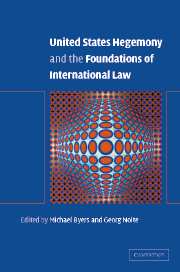Book contents
- Frontmatter
- Contents
- List of contributors
- Preface
- Introduction: the complexities of foundational change
- PART I International community
- 1 The international community, international law, and the United States: three in one, two against one, or one and the same?
- 2 The influence of the United States on the concept of the “International Community”
- 3 Comments on chapters 1 and 2
- PART II Sovereign equality
- PART III Use of force
- PART IV Customary international law
- PART V Law of treaties
- PART VI Compliance
- Conclusion
- Index
3 - Comments on chapters 1 and 2
Published online by Cambridge University Press: 13 July 2009
- Frontmatter
- Contents
- List of contributors
- Preface
- Introduction: the complexities of foundational change
- PART I International community
- 1 The international community, international law, and the United States: three in one, two against one, or one and the same?
- 2 The influence of the United States on the concept of the “International Community”
- 3 Comments on chapters 1 and 2
- PART II Sovereign equality
- PART III Use of force
- PART IV Customary international law
- PART V Law of treaties
- PART VI Compliance
- Conclusion
- Index
Summary
Martti Koskenniemi
Reflecting upon the nature of the Roman Empire in the fifth decade before Christ, Cicero stated what was to be a key point in the classical heritage. There was but one right law – just as there was one right reason. “[A]ll nations at all times will be bound by this eternal and unchangeable law.” The political implication was clear: reason being law, all people sharing reason, they also share the law – “and those who have these things in common must be considered members of the same state.” This membership was what differentiated human beings from animals and made them resemble gods. The way to Empire, too, was firmly set: “Do we not see that the best people are given the right to rule by nature herself, with the greatest benefit to the weak?” Rome is law, law is reason, reason is universal: Rome is universal.
But community is in the eye of the beholder and synthetic thought is just as able to find it anywhere as the tools of analysis convince us that it “really” is nowhere. As Andreas Paulus points out, the idea of a legal system implies the presence of a legal community. Correspondingly, “poststructuralist” deconstruction reduces every community into a series of polar opposites between any number of its elements. Hence the paradoxical fact that nationalism and internationalism, statehood and the universal community, appear to be bound together in a dialectical unity that Jonathan Rée has labelled “internationality.”
- Type
- Chapter
- Information
- Publisher: Cambridge University PressPrint publication year: 2003
- 1
- Cited by



